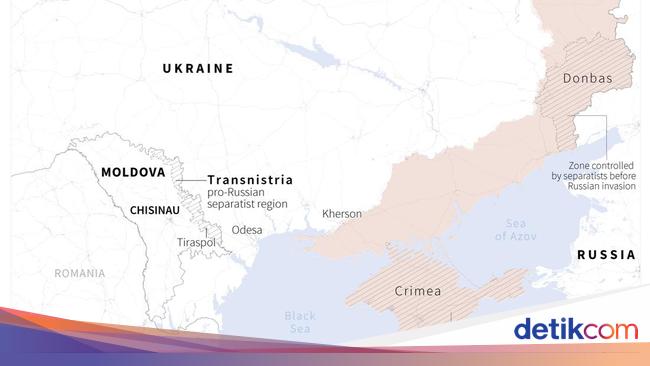Russia Receives Appeal from Transnistria for Annexation Amidst Tensions with Moldova
In a move that has escalated tensions between Russia and Moldova, the breakaway region of Transnistria has appealed to Russia for annexation. Transnistria, which borders Moldova and Ukraine, has functioned as an unrecognized state since the collapse of the Soviet Union. The region is predominantly populated by Russians, Ukrainians, and Moldovans, and it has maintained its Soviet-era hammer and sickle flag while using Russian as one of its official languages.
The appeal for annexation comes as Moscow has recently made it easier for Moldovans to obtain Russian citizenship, further complicating the already fragile situation. Moldova has consistently denied putting pressure on Transnistria and instead accused Russia of destabilizing the country through its actions in the breakaway region.
Russian President Vladimir Putin, who has previously annexed multiple regions of Ukraine in violation of international law, is scheduled to make a significant address to Russia’s parliament on Thursday. This announcement has raised concerns among neighboring countries, especially Moldova, as they fear it could signal Russia’s intentions towards Transnistria.
The region of Transnistria held an internationally unrecognized referendum in 2006, where 98 percent of Transnistrian voters officially backed the “free accession of Transnistria to the Russian Federation.” However, since then, Moscow has been hesitant to take any further steps towards annexation. Despite this, Russia maintains a military presence of around 1,500 troops in the region, which it refers to as “peacekeepers,” effectively preventing any possibility of reunification with Moldova.
The Russian foreign ministry has responded to the appeal by stating that the protection of Transnistrian residents, including Russian citizens, is one of its priorities. They have promised to consider the appeal, further fueling speculation about Russia’s intentions in the region.
The situation in Transnistria remains complex and highly sensitive, with potential implications for regional stability. Moldova, already grappling with political and economic challenges, is concerned about the potential consequences of a Russian annexation of Transnistria. The appeal from Transnistria has further strained relations between Russia and Moldova, and it remains to be seen how the situation will unfold.
As tensions continue to rise, it is crucial for all parties involved to engage in diplomatic dialogue and seek peaceful resolutions. The international community must closely monitor the developments in Transnistria and work towards finding a mutually agreeable solution that respects the sovereignty and territorial integrity of all nations involved.
Denis Leven, hosted at POLITICO under the EU-funded EU4FreeMedia residency program, provides valuable insights into the situation in Transnistria. His expertise sheds light on the complexities of the region and the potential implications of Russia’s response to the appeal for annexation. As the situation unfolds, it is essential to stay informed and engaged with the evolving dynamics in this volatile region.
